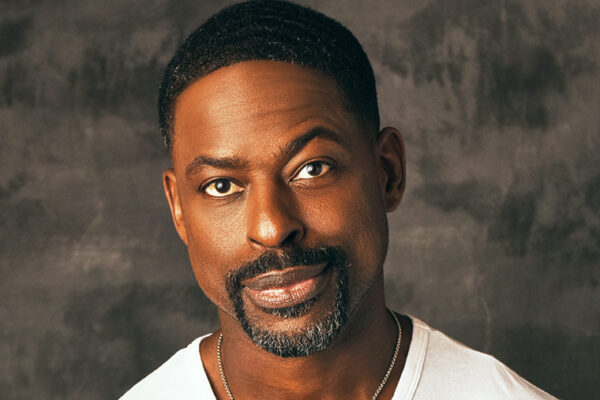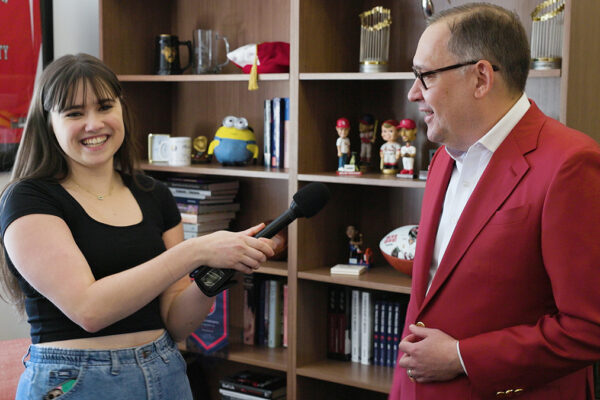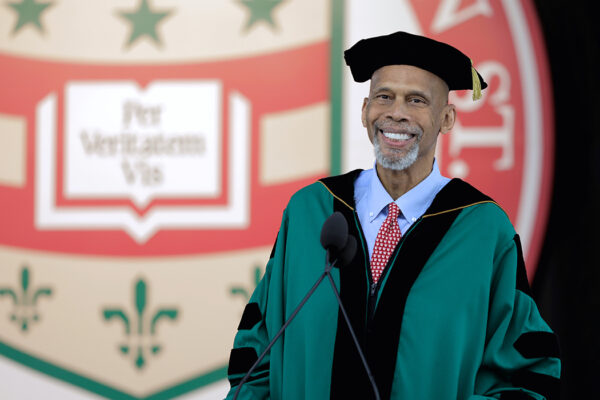The path to graduation day at Washington University in St. Louis took many twists and turns for Commencement student speakers Nicholas Armstrong and Samm Kaiser.
Before studying law at the School of Law, Armstrong earned a graduate degree in community and regional planning from the University of Texas at Austin and worked as an urban planner in Texas.
And Kaiser, a computer science and math major at the McKelvey School of Engineering, decided to pursue a second degree in environmental analysis in Arts & Sciences after working on an organic farm.
“I’ve loved the journey,” Armstrong said. “Every experience matters.”
Those experiences have led Armstrong and Kaiser to Francis Olympic Field for the university’s 162nd Commencement ceremony, which takes place at 9 a.m. Monday, May 15. Drake Shafer, a candidate for bachelor’s degrees in marketing and supply chain management from Olin Business School, will open the ceremony with “America the Beautiful.” And Meher Arora, a bachelor’s degree candidate in biology from Arts & Sciences, will close Commencement with the “Alma Mater.”
Here, the two speakers preview their speeches and reflect on their years at Washington University.
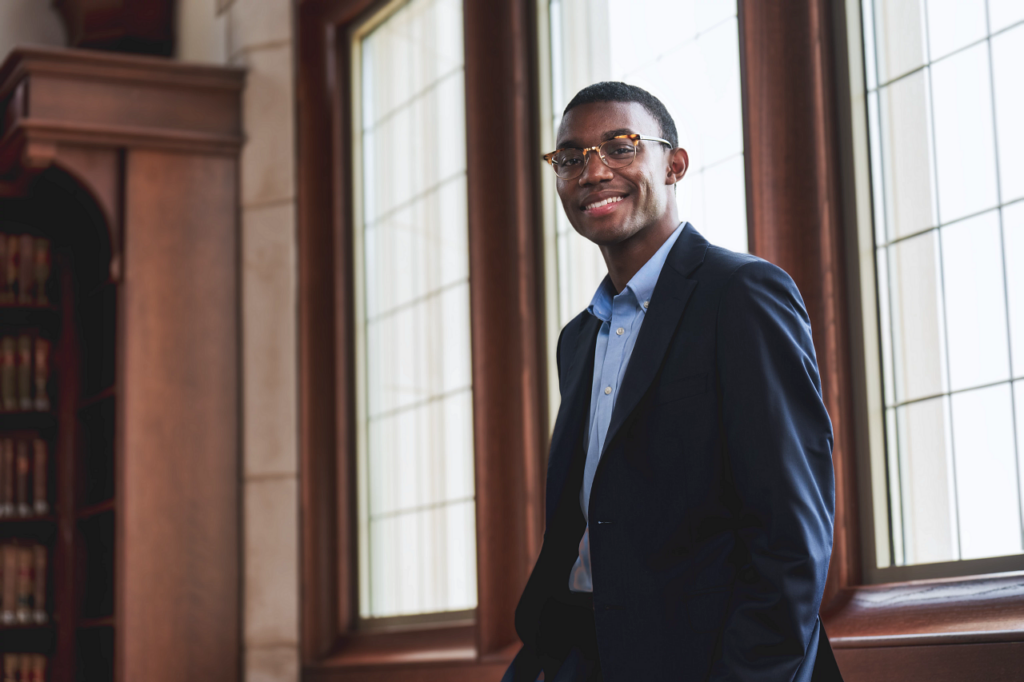
‘Ready to do my part’
After a year of online classes and Zoom study groups, Armstrong went all in for his remaining time on campus. He served as a student representative to the Board of Trustees, editor-in-chief of the Washington University Journal of Law and Policy, co-president of the Real Estate Law Society and as a member of the Student Bar Association’s Honor Council and the dean’s Student Advisory Council.
“Before the pandemic, I was the sort of person who would join one or two extracurricular activities, but the pandemic taught me to not take any opportunity for granted, whether it’s having a conversation with a professor or leading an organization,” said Armstrong, who is from Houston. “These past few years, I’ve really challenged myself in new ways.”
Case in point: Speaking before some 3,500 graduates and their families at Commencement. When Vijay Ramani, vice provost for graduate education and international affairs, asked him to serve as the graduate student speaker, Armstrong knew he could not refuse. Armstrong said he plans to speak about the value of transitions.
“Yes, I was a little intimidated at first,” Armstrong said. “But I’m not thinking about speaking before a large body of people. I’m thinking that I’ve been given a big opportunity on a special day.”
After graduation, Armstrong will join Thompson Coburn LLP in St. Louis. He also hopes to continue the work he started during his externship at the Neighborhood Vacancy Initiative of Legal Services of Eastern Missouri. With help from the city’s top firms, the program’s small staff of dedicated lawyers helps community organizations address blighted properties and provides free legal assistance to low-income and senior homeowners.
“The work they do is incredibly powerful and impactful,” Armstrong said. “Even if it is in a small way, I want to contribute to its mission. I believe there is opportunity and promise here, but only if we take the challenges seriously. I’m ready to do my part.”
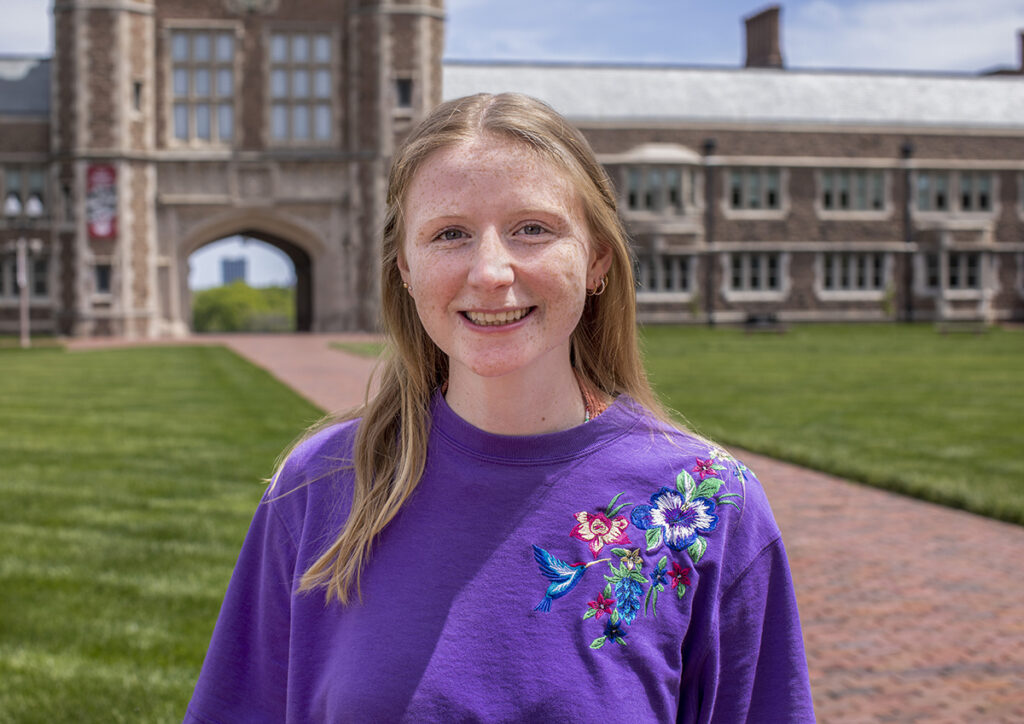
‘I love being on a team’
Waiting at the intersection of Forest Park Parkway and Skinker Boulevard, Samm Kaiser mulled the concept of quantum superposition. As one does.
“I was thinking that life is weird and it’s full of a lot of conflicting things that don’t make sense but have to make sense,” Kaiser said. “And it reminded me of quantum superposition, which I learned about in quantum computing class and thought I’d never use.”
Kaiser went home and turned her thoughts into a three-minute speech to submit to the Commencement office. Unlike graduate student speakers, who are selected by the Office of the Provost, undergraduate speakers must apply for the honor. Kaiser had dreamed of speaking at her college commencement ever since she addressed classmates at her middle school graduation.
“I had so much fun, and I always thought it would be great to deliver a speech at something more impressive than an eighth-grade graduation,” said Kaiser, who grew up in Evanston, Ill.
Kaiser came to Washington University to play volleyball and enroll in the new computer science and math program at McKelvey Engineering. She imagined that one day she would get a job in tech. Then COVID-19 hit. Kaiser took a gap year to help friends convert a conventional farm into an organic one.
“Doing something with the environment was always the plan, but that experience expanded my idea of what was possible,” Kaiser said. “I came back and declared a second major in environmental analysis and ran with it.”
Kaiser also joined the Office of Sustainability, where she helped organize the Green Cup, an annual competition to reduce energy in the residential colleges, and other sustainability events.
After graduation, Kaiser will serve as an education fellow at Tyson Research Center, the university’s environmental field station in Eureka, Mo., and then move to New York City to help Adamah, a Jewish climate organization, organize student chapters in schools and synagogues. The fellowship is through Avodah, an immersive service year program.
“My love for this sort of engagement work comes from volleyball,” Kaiser said. “I love working with young people and I love being on a team.”
